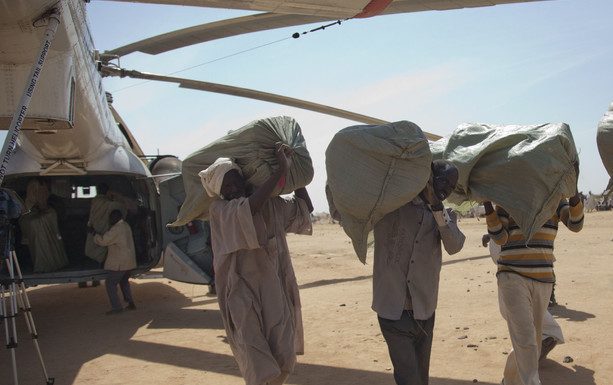
In addition to the daily challenges that all aid actors in Sudan must navigate, there are a number of deeper issues where aid has the ability to affect Sudan’s longer-term transition. The Conflict Sensitivity Facility (CSF) has identified four key areas where the aid sector has the potential to either contribute to ongoing or future conflict, or to contribute to peace. Here, we’ll take you through them quickly, highlighting some of the risks, challenges and opportunities they raise. In the coming months, we’ll delve deeper into the nuts and bolts of each of the windows, sharing ideas and practical steps to help aid workers and donors navigate each in a way that contributes to lasting peace.
Devolving more decision making power and resources to local organisations engaged in the delivery of aid has been high on the agenda of the international aid system since at least 2016. Yet it is an area where the global aid community has struggled to make any substantial progress. There are many historical and systemic reasons for this. Sudan however, faces additional challenges and opportunities for localisation that relate to its long, contested history of state manipulation and efforts to control aid.
Greater local ownership over aid is fundamental for enabling more conflict sensitive aid programmes and strategies. It improves the contextualization, adaptability and appropriateness of aid, builds local capacity and systems, and promotes and enables local ownership and innovation over Sudan-specific challenges. The CSF will seek to support ways that local actors can better feed into aid strategies and approaches and provide mentoring and opportunities for national NGOs to help them work in conflict sensitive ways.
Millions of Sudanese people have been displaced from their homes in recent decades by a multitude of economic, ecological or conflict-related factors. Climate change is likely to result in new patterns of displacement, forcing large scale movements of people into new areas. The implications cross many sectors, including humanitarian, development, peacebuilding and economic policy. Alongside a displacement crisis, contested land use and natural resource management challenges that emerge will contribute to livelihoods emergencies and potentially spark localised conflicts. Bad agricultural and land use policies can impact the national economy and, when they lead to shortages in bread and sugar, drive government-toppling protests. Sudan’s peace process includes provisions for a massive anticipated returns process, which will have direct implications for livelihoods and economy, shaped by both policies around land reform as well as the humanitarian toolkit around ‘Housing, Land and Property’ (HLP).
These linkages are an important component to Sudan’s fragile transition, one that will be shaped – sometimes unwittingly – by donors, policy-makers, and aid actors whose work around returns and livelihoods connects to land use, land claims, and natural resource management.
Throughout Sudan’s history, economic and political marginalisation has led to armed movements seeking power, whether for autonomy within their own areas or for control of the state. Land, money and people are the fundamental resources for these movements, and the powerful people who lead them. This has massive implications for aid.
These contestations over land, people and resources are at work in Sudan’s ongoing peace process. Political and military leaders in Sudan’s peripheries are boosting their negotiating position by amassing control of land, resources and people. In these times of economic crisis, food aid is one of the key resources available to these actors to build their constituencies. The way that aid is delivered can either help to encourage and enable greater transparency and accountability, or it can feed into opaque patronage networks and corruption. Many aid workers report having received conflicting guidance on how to engage with non-state actors and are not always sure how to manage these dynamics.
The 2019 Revolution opened space for new approaches to exercising power within Sudan. It is not however yet clear how these new voices will be able to participate. Groups from Sudan’s peripheries and segments of society such as women and young people have traditionally been unable to fully participate in decision making process that determine their own futures, let alone that of their country. Both women and young people demonstrated enormous political agency during the revolution, but their participation in the ongoing transition is threatened by old norms around gender and generations – a likely source of fragility going forward.
Aid actors in Sudan often find themselves bound to these same patterns and can sometimes perpetuate them without meaning to. For example, many programmes are still designed, funded and overseen by people who live in Khartoum, and do not understand the contexts in the areas where the aid is provided. Meanwhile, disparities in educational opportunities within the country mean that many of the senior Sudanese aid workers within the U.N., donors and NGOs are from the same elite circles as the government. Many agencies have subsequently been unable to fill gaps in knowledge about what aid’s role could or should be at the subnational level and within marginalized groups.
_______________________________________________________________________________
While Sudanese will provide the best solutions to these challenges, the aid system has the resources and presence to shape them – for better or worse. The CSF will work closely with all aid actors to help them to disentangle and navigate these challenges and questions in collaboration with the communities they support, offering practical guidance, analysis and the right conversations when they’re needed.
Visit us online and sign up to receive more analysis, events, and trainings at www.csf-sudan.org/#subscribe, or reach out to us at info@csf-sudan.org.